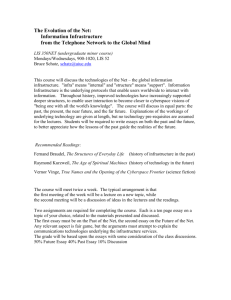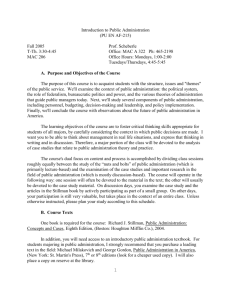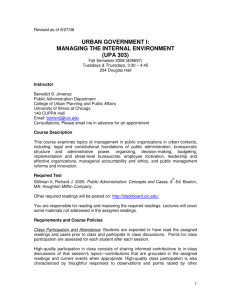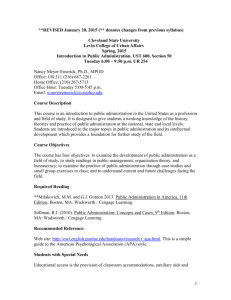POLS 3340-01 Introduction to Public Administration Spring 2013
advertisement
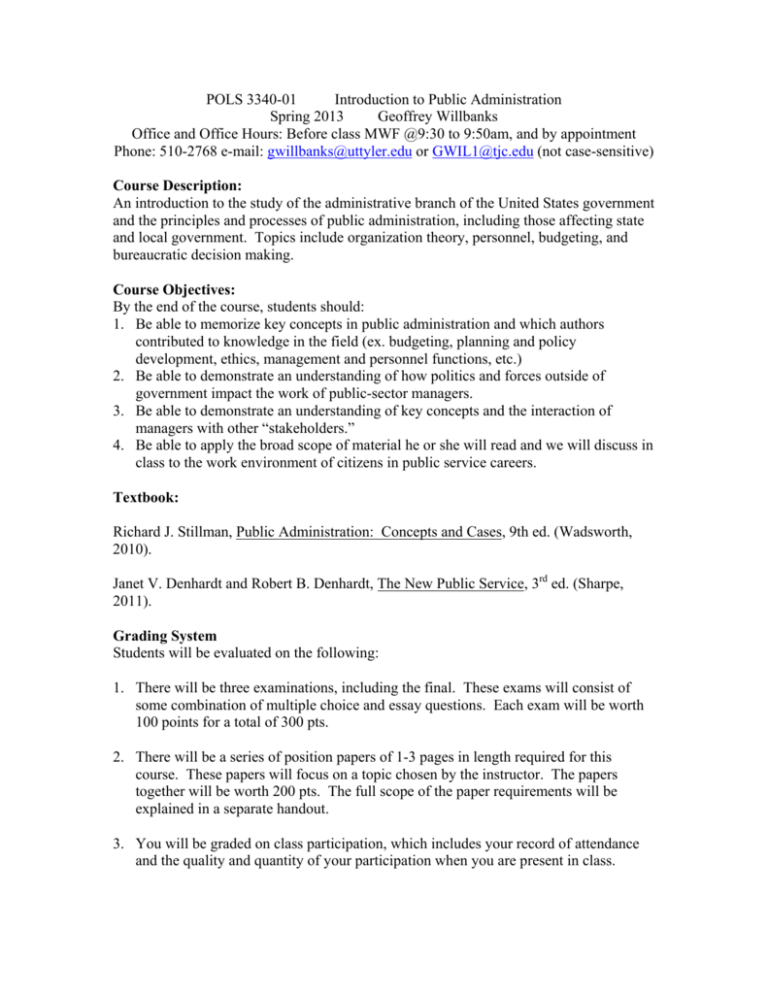
POLS 3340-01 Introduction to Public Administration Spring 2013 Geoffrey Willbanks Office and Office Hours: Before class MWF @9:30 to 9:50am, and by appointment Phone: 510-2768 e-mail: gwillbanks@uttyler.edu or GWIL1@tjc.edu (not case-sensitive) Course Description: An introduction to the study of the administrative branch of the United States government and the principles and processes of public administration, including those affecting state and local government. Topics include organization theory, personnel, budgeting, and bureaucratic decision making. Course Objectives: By the end of the course, students should: 1. Be able to memorize key concepts in public administration and which authors contributed to knowledge in the field (ex. budgeting, planning and policy development, ethics, management and personnel functions, etc.) 2. Be able to demonstrate an understanding of how politics and forces outside of government impact the work of public-sector managers. 3. Be able to demonstrate an understanding of key concepts and the interaction of managers with other “stakeholders.” 4. Be able to apply the broad scope of material he or she will read and we will discuss in class to the work environment of citizens in public service careers. Textbook: Richard J. Stillman, Public Administration: Concepts and Cases, 9th ed. (Wadsworth, 2010). Janet V. Denhardt and Robert B. Denhardt, The New Public Service, 3rd ed. (Sharpe, 2011). Grading System Students will be evaluated on the following: 1. There will be three examinations, including the final. These exams will consist of some combination of multiple choice and essay questions. Each exam will be worth 100 points for a total of 300 pts. 2. There will be a series of position papers of 1-3 pages in length required for this course. These papers will focus on a topic chosen by the instructor. The papers together will be worth 200 pts. The full scope of the paper requirements will be explained in a separate handout. 3. You will be graded on class participation, which includes your record of attendance and the quality and quantity of your participation when you are present in class. 2 Although it will not be a formal part of the grade, I will use attendance in cases of very close calls between two letter grades. Thus, the grading scale is as follows: 450-500 = A 400-449 = B 350-399 = C 300-349 = D 000-299 = F Class Schedule: I. Introduction: The Study of Administration Jan 11 Stillman, Chapter 1 Reading 1.1: Woodrow Wilson, “The Study of Administration” Jan 14 Reading 1.2: Richard J. Stillman, “The Study of Public Administration in the United States” Jan. 16 Case Study 1: “The Blast in Centralia No. 5” Jan. 18 II. The Environment of Public Administration A. Bureaucracy Stillman, Chapter 2 Reading 2: Max Weber, “Bureaucracy” Case Study 2: “How Kristin Died” Martin Luther King Day is Monday, Jan 21 Jan. 23 Jan. 25 No class meeting B. The General Environment and the Public Sector Stillman, Chapter 3 Reading 3: John Gaus, “The Ecology of Public Administration” Jan 28 Case Study 3: William Robertson:” Exemplar of Politics and Public Management Rightly Understood” Jan 30 C. The Place of Power and Politics in Public Administration Stillman, Chapter 4 Reading 4: Norton Long, “Power and Administration” Case Study 4: “The Columbia Accident” Feb 1 Feb 4 D. Formal and Informal Groups and Behavior Stillman, Chapter 6 Reading 6: Elton Mayo, “Hawthorne and the Western Electric Co.” Case Study 6: “American Ground: Unbuilding the World Trade Ctr.” Feb 8 Feb 11 3 TEST 1 ------------ Whatever We Have Covered by Now --- February 13 III. The Major Activities of Public Administrators A. Decision Making Stillman, Chapter 8 Reading 8: Charles Lindblom, “The Science of “Muddling Through” Case Study 8: “How a City Slowly Drowned” Feb 15 Feb 18 B. Communicating Stillman, Chapter 9 Reading 9: James Garnett, “Administrative Communication” Feb 20 Willbanks attending Conference: No class Feb 22 Case Study 9: “The Shootings at Columbine High School” Feb 25 C. Managing (Effectively and in Collaboration with Others) Stillman, Chapter 10 Reading 10: Thomson and Perry, “Collaboration Processes” Case Study 10: “Government as Catalyst” Feb 27 Mar 1 D. Motivating Personnel Stillman, Chapt.11 Reading 11: Lois Wise, “The Public Service Culture” Mar 4 Willbanks attending Conference: No class Case Study 11: “Who Brought Bernadine Healy Down?” Spring Break Mid-March Mar 6 Mar 8 ------------------------------------------------------------------- E. Budgeting Stillman, Chapter 12 Reading 12: Irene Rubin, “The Politics of Public Budgets” Mar 18 Case Study 12: “Death of a Spy Satellite Program” Mar 20 Note: Mar 25 is the last day to withdraw from a course with an auto. W TEST 2 ---- Everything covered AFTER Test 1 ------- March 22 4 IV. Enduring Questions and Issue In Public Administration A. Democratic Values, Citizenship, and Service Denhardt and Denhardt, The New Public Service Chapter One Mar 25 Chapter Two Mar27-29 Chapter Three Apr 1 Chapter Four Apr 3-5 Chapter Five Apr 8 Chapter Six Apr 10-12 Chapter Eight Apr 15 Chapter Nine Apr 17 Chapter Eleven Apr 19 (These dates are approximate and subject to change as we cover the topics from Mar 25 to Apr19) B. Politics and Administration Stillman, Chapter 14 Reading 14: Hugh Heclo, “Issue Networks and the Executive Establishment” Case Study 14: “Reinventing School Lunch” Apr 22 Apr 24 C. Ethics in Public Administration Stillman, Chapter 16 Reading 16: Dwight Waldo, “Public Administration and Ethics” Case Study 16: “The Case of the Butterfly Ballot” Apr 26 Apr 29 May 1 Catch-up day if we are behind, handing back papers, reviewing for final exam, etc. (attendance still required) May 3-8 Study Days; Class will not meet. FINAL EXAM ------ Everything Covered Since Test 2 ------(Tentative Date) May 10 Friday, (8:00-10:00 am) 5 Class Policies: Upper-Division Political Science Courses General Statement Regarding the Conduct of the Class I view the teaching and learning aspect of university life to be the central purpose of the university, an institution that is unique in our culture. Consequently, I do not view students as “customers,” and I do not view myself as an “employee.” I view myself as a professional, and I view you as one who is present in my class to learn about the subject matter pertaining to the class. I spend considerable time and attention choosing texts and other readings that are central to your mastering of the subject matter, and I conduct scholarly research and publication with the aim of making myself a more informed teacher. Your grade in the course will reflect the quality of your work, and nothing else, based on my professional judgment. I will also do the best I can to know your name, and I will always try to respect you an as individual. Attendance Policy In all classes attendance is mandatory, not optional. Even in large classes, I will take the class roll in some form or fashion to monitor attendance. Class participation is a small, but formal part of the grade in this course. Most of your class participation grade will be based on your attendance in the course. If you miss class because of university responsibilities, please let me know ahead of time and have some documentation. Any work missed will be made up as soon as possible, in consultation with me. Makeup examinations will be given if a valid excuse for missing an examination is provided. Makeup examinations will be scheduled such that everyone missing the original examination can be present, so I do not have to administer several examinations on an individual basis. Grading Policy Examinations will consist of objective, multiple-choice questions (mostly) with an essay component. Thus, class attendance and good note taking, as well as thorough reading of course materials, are necessities to receiving high grades. Written papers in this class will consist of position papers, which will be explained in more detail in a separate handout. Disability Statement If you have a disability, including a learning disability, for which you request disability support services/accommodation(s), please contact Ida McDonald in the Disability Support Services office so that the appropriate arrangements may be made. In accordance with federal law, a student requesting disability support services/accommodation(s) must provide documentation of his/her disability to the Disability Support Services counselor. For more information, call or visit the Student Services Center located in the University Center, Room 282. The telephone number is 566-7079 (TDD 565-5579). Additional information may be obtained at the following UT-Tyler web address: http://www.uttyler.edu/disabilityservices. 6 Social Security Statement It is the policy of The University of Texas at Tyler to protect the confidential nature of social security numbers. The University has changed its computer programming so that all students have an identification number. Note Regarding Student Absence due to Religious Observance Students who anticipate being absent from class due to a religious observance are requested to inform the instructor by the second class meeting of such absences. The Writing Center Located in BUS 202, the UT-Tyler Writing Center provides professional writing tutoring for all students in all disciplines. If you wish to use the Writing Center, you should plan for a minimum of two hour-long tutorials per assignment: the first to provide an initial consultation and drafting plan, and the second to follow up. Be prepared to take an active role in your learning – you will be expected to write and/or discuss your work during your tutorial. While Writing Center tutors are happy to provide constructive criticism and teach effective writing techniques, under no circumstances will they fix your paper for you. Appointments: 565-5995. More information: www.uttyler.edu/writingcenter. Grade Replacement If you are repeating this course for a grade replacement, you must file An Intent to Receive Grade Forgiveness form with the registrar by the 12th day of class. Failure to file an Intent to Receive Grade Forgiveness will result in both the original and repeated grade being used to calculate your overall grade point average. A student will receive grade forgiveness (grade replacement) for only three (undergraduate student) or two (graduate student) course repeats during his/her career at UT Tyler (2006-08 Catalog, p. 35). 7 Position Paper Instructions Position papers are papers that are assigned so the student can gain some specific, new knowledge on a topic of interest to that covered or only briefly covered in class. Position papers should represent a significant critical thinking and research effort. Position papers should be well-written and professionally presented, in addition to being well-researched. Since the papers will be limited to a maximum of three pages, the student must present the information clearly, logically and succinctly. Papers filled with nongermane filler or too much non-essential details will receive few points. Position papers in the social sciences should consist of description to be sure, but should focus on explaining, analyzing and most important presenting conclusions about the topic. The student should devote some of the paper to a description of the concept(s) based on what other authors say and then provide a summary of the key facts one should know about the topic. Analysis should consist of the original thinking of the student as to how the question(s) of the paper fits into the broad framework of the literature in the field we are studying. In the analysis, the student should answer the questions, “So what?” and “What position am I taking on this issue and why?” Most importantly, the student should provide one of two possible answers; a conclusion or a recommended set of actions for the given situation. (A conclusion may include acknowledgement that there is no solution under the given circumstances). These might be steps that public administrators should take to solve the problem or might be a conceptions framework administrators should use in taking actions in response to a given situation. Students should follow the APA style manual in preparing the paper. Papers should be proofread for typographical errors, misspelled words, and grammatical errors. The Writing Center may be able to help with some of these items. Additionally, use good sources, meaning authorities in the subject matter. Students should begin with the appropriate text from the course. Do not overuse internet sources unless you are using the web to access professional journals. You should not use blogs, twitter, etc. Instead, use opinion and editorial pieces from reputable journals and newspapers, books, scholarly journal articles, etc. Do not use Wikipedia as a source of information, although Wikipedia may provide you with some links to valuable sources. Each paper may receive up to twenty points. The ten points are divided into two portions with the first sixteen points based on your individual work. I will grade the paper based on how well you answer the question(s). I will also grade the paper based on the quality of your writing, your ability to organize the paper in a meaningful way, and your ability to follow APA format. The remaining four points for each paper will come from a group grade. Students will write ten papers in total. On the day for the chosen topic, students in a group will have class time to compose a single joint answer to present to the class. The group will each receive a 0-4 based on the presentation for that paper. Important note: I will check your paper for plagiarism, so do not even think about it. Cite all ideas you use that you learned about from other authors; also, if you use direct quotes -- which you should rarely place in the paper -- locate those quotes in quotation marks and cite the source (including the page number where you found the quote). Remember, this is your effort to synthesize in your own words the material you have read from other authors. Position papers are due at the beginning of class on the assigned date for the group present. Student should bring two copies of each paper; one for the instructor and one for the group. Papers turned in after that time will be penalized. A student not submitting a paper to the instructor or their group will receive a zero for the paper. Papers must be received on or before the day of the deadline for credit. Students may email papers to the instructor for credit if not present in class. If emailed, papers must be received by midnight of the day before the deadline. Allowance will be made for serious illness and official school functions. But under no circumstance will a student receive credit for the two points if the paper is not received before the deadline.







